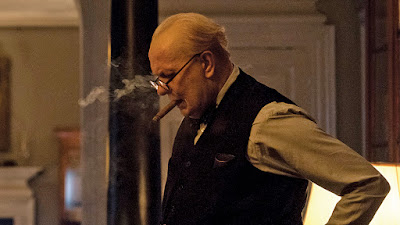At the level of a surface observation “Dunkirk” is a historical document about the evacuation of British troops on the coast of France as the Nazis closed in on them, but at a deeper level it is a testament to the audacious power of pure elemental filmmaking. After a handful of taut, tense minutes of almost wordless attacks and ambushes, we begin to sense the stark motivations of its director; borrowing heavily from the technical mechanics of Hitchcock, Eisenstein and even Griffiths, Chris Nolan freely abandons the constraints of a straightforward retelling and conducts a methodical descent into the sensory resonance of sound and movement. It is the film he has been seemingly moving towards ever since his early days as a force of intrigue – a full-fledged mood piece conducted with the utmost skill and fortitude. Some, perhaps rightfully, have described the undertaking as his most powerful excursion to date – and if films earn their merit based on the emotions they conduct in the audience, few of us will walk away doubting whether he is capable of blurring the boundary between a distant event and an immediate experience.
Wednesday, February 28, 2018
Tuesday, February 27, 2018
Lady Bird / **** (2017)
Deep love is the central influence of the most fundamental disagreements between mothers and daughters. A friction is roused when a common goal is challenged by methods each sees as wrong or fruitless. Consider what transpires between the young heroine of “Lady Bird” and her mother Marion. Both results of a biting sarcasm permeating through their middle-class existence, each has a concept of how the other should behave in their role but is rarely affirmed by a sense of encouragement. Both, for instance, believe Lady Bird, now a senior in a Catholic high school, ought to advancer her education. She wants to attend a school in New York (“I want to go somewhere with culture,” she says). But Marion, conscious of her daughter’s trajectory as an underachiever, suggests a local community college. And then the two engage in the first of what must be a life’s worth of arguments that escalate, rather heatedly, into personal diatribes about each other’s vulnerabilities. At a certain point it almost becomes insufferably awkward, until the teenager decides to abruptly leave the conversation by tumbling out of a moving car. And so begins – or continues? – a journey where both must come to see one another not as immovable forces, but as independent thinkers capable of making the most informed choices available to them.
Tuesday, February 20, 2018
Get Out / **** (2017)
A startling honesty ensnares Jordan Peele for every frame he directs “Get Out,” a thriller where the jolts come not from boogeymen or supernatural forces, but an attitude that coalesces within a closed world of privilege and etiquette. This, he argues, is a threat easily concealed behind the eager banalities of others, who engage their victims with the sort of deference that displaces them from the acknowledgment of an immediate danger. Consider how this affects the main character. He is a street-smart guy on his way to meet the parents of his girlfriend, confident and funny, yet quietly dealing with an anxious quandary: they may not be entirely happy with the notion that he is black. When he arrives, however, he discovers not only a welcoming environment, but an awfully convenient sense of acceptance; the parents seem so auspicious that it hardly seems genuine. And then there’s the matter of their servants – all black, each smiling sharply and with vacant expressions, as if stand-ins for the Stepfords. Is his worry unfounded, fueled by the unfamiliar territory he has descended in? Or are the courteous gestures of others a symbol for something far more devious? Peele discovers a disconcerting reality underneath that is as complex as it is timely; he has made not only a tremendously fascinating film, but the first act of cultural relevance in an era where hate has been brought back into political fashion.
Wednesday, February 14, 2018
Phantom Thread / **** (2017)
Although “Phantom Thread” is said to be written under entirely original circumstances, the actual source of P.T. Anderson’s film comes from a personal experience, during which he was stricken ill and tended to by his wife who looked upon him with a “tenderness” he had rarely experienced. This, he notes, is the central point driving the circumstances surrounding the characters of his story, who otherwise seem to float through a dreamlike trance of emotional distance and faux courtesies. At the tip of the pattern is a man who would suggest dissonance from that prospect – a gifted dressmaker named Reynolds Woodcock, who charges himself with amplifying the presence of bored and insecure women into the upper ranks of social grace. But he takes his task so seriously that, in some cases, the result must thoroughly transcend the model, even if she barely warrants his stellar reputation. A vital scene is worth considering: after designing a dress for an otherwise insufferable middle-aged woman and apprehensively attending her reception, she proceeds to behave in such a sloppy manner that the dress suddenly becomes a device of judgment – she is now unworthy, and the camera spies him furiously removing the bodice while she is passed out drunk in an upstairs bedroom.
Monday, February 12, 2018
Call Me By Your Name / ***1/2 (2017)
To sense the free-spirited candor of the characters in “Call Me by Your Name” is to recognize a measured development of male romance in the eyes of the Hollywood mainstream, where stories about gay characters have conventionally existed under the weight of a pervasive sociological subtext. In those circumstances, the love between the leads is rarely about the lust or the connection; they are guarded from more liberated behaviors as a means to emphasize an era, a not-too-distant time where homosexual impulses were either frowned upon, cause for mental concern or discouraged through violence. Those are, perhaps, the themes of filmmakers with an outsider’s view of the lifestyle (although no less important). But now comes a moment in time where the lessons of “Brokeback Mountain,” “Weekend” and “Moonlight” have relaxed the aesthetic chokehold and paved the route for a sweet and loving film where the characters are less mindful of an outside response and more consumed by the amorous temptations they possess. If that, in this political climate, leads any in the audience down a rabbit hole they still find discomfort in, their experience is best underscored by the pointed words of a noted observer: “nature has cunning ways of finding our weakest spot.”
Tuesday, February 6, 2018
Darkest Hour / ** (2017)
My first encounter with the versatile Gary Oldman originates from the age of 12, during a home viewing of “Bram Stoker’s Dracula,” where I first gazed at the eyes of a man with an unmistakable magnetism. His was the first figure to emerge on the screen, and somehow it had a disarming quality; a handsome and approachable face, full of plausible romantic longings, felt decidedly against the type we expected of a conventional villain. After he disappeared following the prologue, my mind raced with some sense of wonder – who was he? Could we come to see him as a negative force, as the story would ultimately require? And how could any woman, however fearful of his curse, find the strength to overcome his desirable advances, however dangerous? Only much later was it pointed out to me that the old man standing in his place during the film’s first act was the same Oldman, caked in heavy makeup to appear as a 300-year-old count in the shadows of Transylvanian architecture (different actors were cast all the time to play older versions of others, I figured). It was a testament to his ability that he was able to create a great enough illusion to fool even me, and over the years I have consciously followed him with the enthusiasm of a fanatic, curious as to what may come next in his life of relentless skin-shedding.
Subscribe to:
Posts (Atom)






